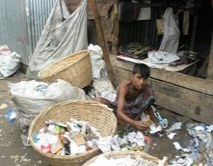Projects in Bangladesh
|
|
ENLIST Randomised controlled trials of methotrexate in Erythema Nodosum Leprosum, 2016-2024
Erythema Nodosum Leprosum (ENL) is a serious and very painful leprosy complication. It is often chronic and causes serious morbidity, not only affecting the skin but also bones, joints, eyes, nerves, testes, and kidneys. Effective treatment for ENL is available but expensive, has considerable side-effects, and is often inaccessible in many countries where leprosy is endemic. Methotrexate is cheap and has been used all over the world to treat conditions like psoriasis since the 1950s. This medicine is possibly an effective alternative to prednisolone (the most widely used corticosteroid treatment for ENL). The London School of Hygiene and Tropical Medicine will validate this by inviting patients with ENL in Bangladesh, Brazil, Ethiopia, India, Indonesia, Nepal and the Philippines to take part in a study where some patients are prescribed methotrexate, and others prednisolone. The Turing Foundation is contributing €350,000 towards this research (€25.000 in 2024). See also:
Leprosy Research Initiative: other projects
Other projects in Brazil
Other projects in Ethiopia
Other projects in India
Other projects in Indonesia
Other projects in Nepal
Other projects in Philippines
 Randomised controlled trials of methotrexate in Erythema Nodosum Leprosum |
 |
Erasmus MC: Monitoring the effect of prophylactic interventions, Bangladesh, 2019-2022
This sudy by Leiden University Medical Centre and Erasmus University Rotterdam is focused on determining the long-term effect of the BCG vaccination on leprosy patients. New blood samples and new biomarker profiles are being used for this purpose. The second aim of the study is to test the effect of the antibiotic rifampicin on preventing leprosy from developing in new leprosy patients' contacts. Blood will be taken from these contacts at different times with a finger prick over the course of the study. The third and final goal of the study is to introduce the test as part of the national leprosy programme and train health centre staff to perform the test. The Turing Foundation has contributed approximately € 1,700,000 towards IDEAL/INDIGO research in recent years, and is contributing more than € 112,500 towards this follow-up research in the period 2019-2021. The Leprosy Research Initiative is contributing an equal sum. See also:
LUMC: other projects
Erasmus Universiteit Rotterdam: other projects
Leprosy Research Initiative: other projects
Other projects in Netherlands
 Monitoring the effect of prophylactic interventions in contacts of leprosy patients including field-application of a novel immunodiagnostic test, Bangladesh |
 |
Research on treatment of early neuropathy in leprosy 2014-2017
The TENLEP Research Consortium (Treatment of Early Neuropathy in Leprosy) is a large international association in which 14 researchers from renowned research institutes all over the world work together, combining their expertise in the field of leprosy-related inflammation of the nerves. TENLEP Trial is a large-scale research project focussing on nerve damage caused by leprosy. Its central research questions are: 2. What is the most effective treatment for patients who have a clinical nerve function impairments? See also:
Other projects in India
Other projects in Indonesia
Other projects in Philippines
Other projects in Brazil
Other projects in Ethiopia
 Scanning Electron Microscopy of M. leprae |
 |
Research on impact of preventive interventions on the transmission of M. Leprae, 2009-2010
The Erasmus University of Rotterdam and the KIT (Royal Tropical Institute) are together doing research into the transmission of the leprosy bacteria and the effects of prophylactic treatments. Prophylactic treatment means that antibiotics are administered to people who do not (yet) suffer from leprosy. This can be compared to the prevention of malaria in travellers by prescribing medicine. In 2001, a research project started into the effects of prophylactic treatment of leprosy contacts on leprosy prevention. It is conducted in North Western Bangladesh. In the past six years all new leprosy cases, whether in- our outside the patient contact group, have been traced. It has been examined whether rifampicin leprosy occurred among the contact group. This appeared to be the case and even more so if the prophylactic treatment was combined with a BCG vaccine - which is today a standard vaccination for most children in the first year of their lives. During the current one year project, the research team aims, on the basis of information already available, to answer several questions related to the transmission of the leprosy bacteria and the success of prophylactic treatment. The Turing Foundation pays 50% (€ 40,000) of the research costs of this project, which will take one year. See also:
Turing Foundation schenkt € 1,1 miljoen aan nieuw lepraonderzoek
Erasmus Universiteit Rotterdam: other projects
Koninklijk Instutuut voor de Tropen: other projects
 mycobacterium leprae |
 |
Construction and equipment Primary School, Chittachong, Bangladesh, 2008-2010
The GlobalCare4All Foundation supports spinal cord lesion patients in a rehabilitation centre in Chittachong, Bangladesh. Moreover, ex-patients are trained to become teachers. They thereby meet an urgent need and are able to build a life. The pilot project has been accomplished successfully. The foundation now plans to construct and equip a retraining centre and primary school, offering retraining programmes and education free of charge to 130 children. The Turing Foundation contributes € 20,000 to this project in 2009, on top of last year's € 40,000. See also:  Lesson by Ex-Spinal Cord Lesion Patient in Bangladesh |
 |
Vocational training for underprivileged young people in Dhaka, Bangladesh, 2009
The Vialisa Foundation's aim is to offer a more hopeful perspective to the underprivileged youth in the slums of Dhaka, Bangladesh. Vialisa offers refresher courses, training and support to young people between the ages of 15 and 22 who have never or hardly ever been to school. The Foundation also mediates in helping them take the next step towards further (vocational) training or onto the job market. The Turing Foundation will contribute €12,500 to Vialisa's activities in 2009. See also:  Beroepsonderwijs voor kansarme jongeren in Dhaka, Bangladesh |

















